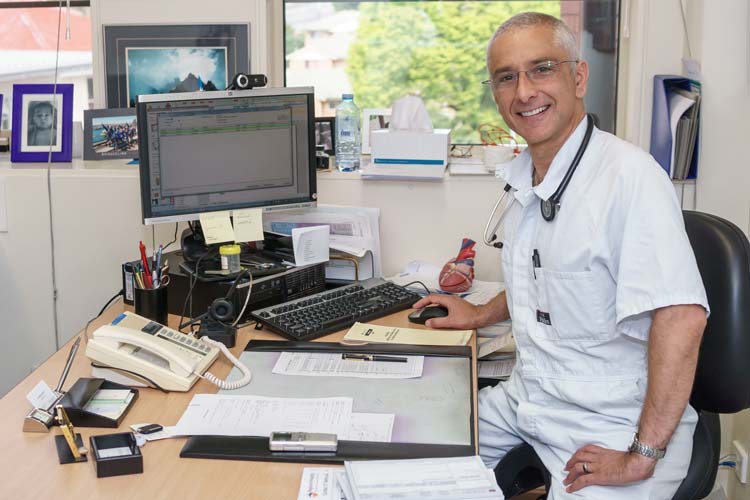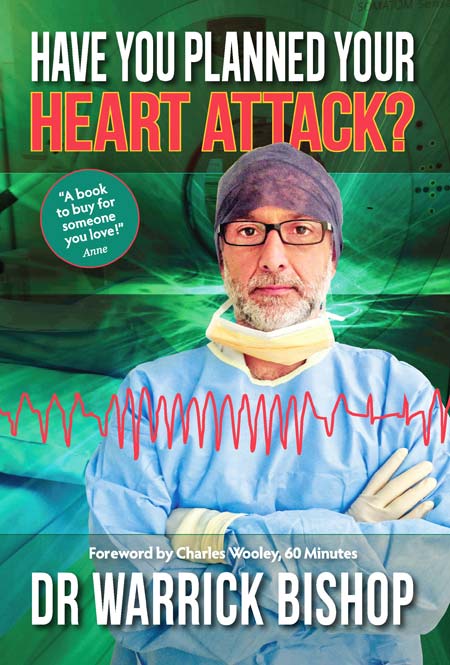According to the Australian Heart Foundation, 55,000 Australians suffer a heart attack each year.
Coronary artery disease remains the largest killer in the Western World despite significant advances in our understanding, diagnosis and management of the condition.
But what if there’s a way to put in place preventative measures to avert a potential problem?
Written by Hobart-based cardiologist Dr Warrick Bishop (below) and released to coincide with Heart Research Month in February, Have You Planned Your Heart Attack? provides readers with an easy to understand, research-driven and proactive approach to preventing cardiac disease.
Dr Bishop provides an insight into modern coronary risk assessment, and why we need to take a more holistic, preventative approach that utilises the latest technology to deal with risk through investigation and management.
“Taking a picture of the coronary arteries using CT to determine their health isn’t new, it just isn’t being done routinely” Dr Bishop says.
“Yet, by using these technological advances you can be ahead of the game about your cardiovascular health. Wouldn’t you want to know if the single biggest killer in the Western world was lurking inside of you?”
So, what can you do to reduce your risk of a heart attack? Dr Bishop shares a few potentially life-saving gems for The Carousel readers below:
1. Make a decision
Decide to look after your heart health. This is important, it is easy to say you’ll do this and do that but unless you make a decision and then a commit to follow through, you are kidding yourself, and this won’t help you.
2. Visit your GP
Not only will your local Doc check blood pressure, blood sugar, lipid profile (cholesterol levels) and an eye to general state of health (how’s that tummy?), they will also provide the guidance you need to head you in the right direction and then most importantly, bring you back for follow up and this means accountability.
3. Make small sustainable changes
there is no point turning your life on it’s head to go from Couch Potato to Olympian. If the changes are not sustainable, then you wont sustain them! Look to small changes by degree with you local Doc guiding you as to best bang for your buck in terms of effort.
4. Just do it
If you are advised to change lifestyle or take tablets, it will be because your doctor believes it will make a difference to your health, so do it!
5. Ask the experts
If you have questions or are unsure about advice, seek out your local doctor for a sensible consultation and discussion, and do this sooner rather than later. My experience is that more and more patients these days seek help from “Doctor Google” – the information can be biased and there is no way to make sure it is relevant for you as an individual. Get good advice and it will pay dividends for the rest of your life.
6. Make use of the technology
Modern technology has evolved to now allow us to look at the arteries of the heart in a “non-invasive” way (meaning not needing any cutting) using CT (or CAT) scanning. This is fairly new and not part of any formalised guidelines in Australia. The test however does provide extra information in certain situations and may then be useful for the individual and doctor involved to tailor care. The sort of issues imaging the heart arteries may help with are:
“My cholesterol is high, is there build up in my arteries?”
“I have a bad family history of hearts, should I be concerned?”
“My doctor says I should be on a statin, but do I really need one?
“I’m on a statin, but I suffer side effects, do I really need a high dose or would a lower dose be adequate?”
“A mate the same age just dropped dead from a heart attack, what’s my risk?”
Though not routine and not covered by a government rebate, some patients choose to pursue this extra information so they have the most information available and hence are best informed to make important decisions about managing their future cardiovascular risk.
7. Live as well as possible for as long as possible
The years fly by so, make the most of them. Keep active, keep a healthy weight, keep in contact with your local doctor and work on your best health because, as we all know, “prevention is better than cure”.
• Have You Planned Your Heart Attack? (RRP $34.99), now available at Amcal, all good book stores and online here.








